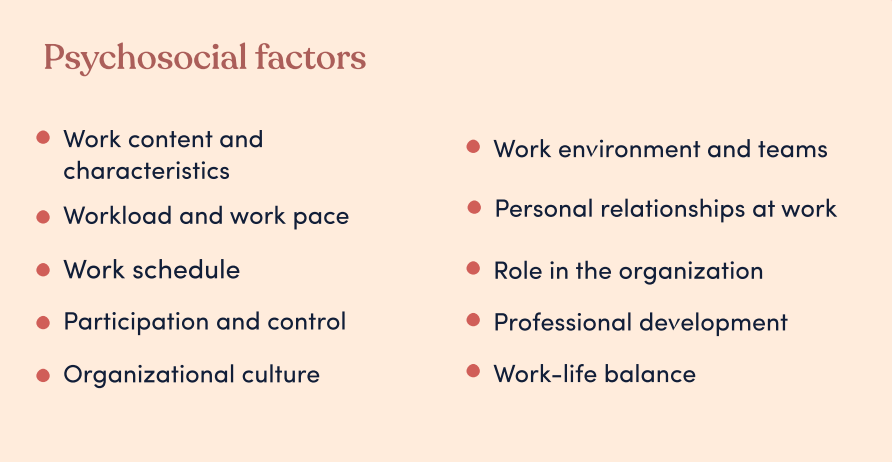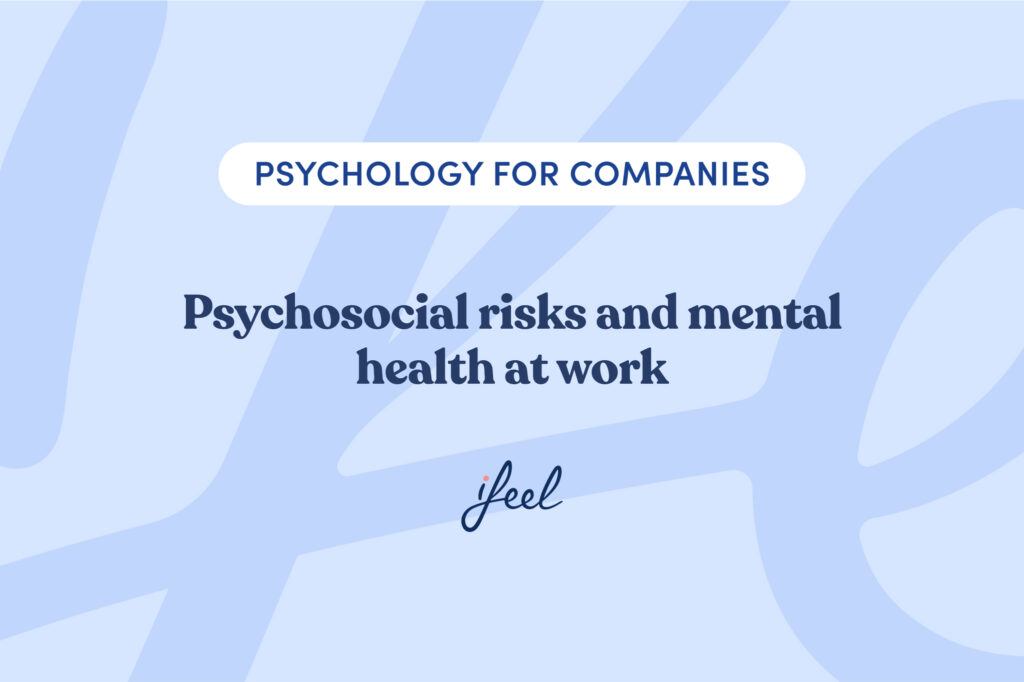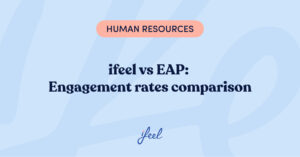In a world where employee well-being is becoming increasingly important, attention to psychosocial risks and mental health at work has become an unavoidable necessity for large organisations. These risks comprise working conditions that can adversely affect workers’ physical and mental health.
This article explores how to identify and effectively manage the relationship between psychosocial risks and mental health at work to transform it into a competitive advantage, improving employee well-being and organisational performance. By integrating well-being practices into daily operations, companies not only develop a healthier work environment but also boost productivity, reduce absenteeism, and strengthen talent retention.
To facilitate this process, we encourage you to download our Psychosocial Risk Factors template to prevent mental health problems at work. You will be able to identify and efficiently address the relationship between psychosocial risks and mental health, promoting your employees‘ well-being and your company’s productivity. Download the template now and improve your work environment!
Understanding psychosocial risks and mental health at work
Psychosocial risks are intrinsic factors in the work environment that can have adverse health consequences. These include the role within the organisation, the workload and pace of work, interpersonal relationships, career development, among others.
These factors entail a psychosocial risk when the company does not take appropriate preventive measures. Therefore, these risks are working conditions that, due to poor or inadequate design, are likely to adversely affect the worker’s health and well-being.
In fact, according to a World Health Organisation (WHO) report, it is estimated that a negative working environment can lead to mental health problems such as anxiety and depression.

The link between psychosocial risks and mental health at work
Understanding the connection between psychosocial risks and mental health at work is crucial to unlocking the potential of your organisation.
Employees’ mental health plays a crucial role in their personal well-being and the organisation’s overall performance. Therefore, a work environment that neglects to identify and manage these risks can face significant consequences.
The reason is that psychosocial risks can trigger stress, anxiety and depression among employees. This deterioration in mental health directly impacts their ability to concentrate, make decisions and maintain effective interpersonal relationships, which in turn reduces productivity and quality of work.
Therefore, ignorance or inadequate management of the relationship between psychosocial risks and mental health at work can lead to problems for the organisation. Such as:
| Consequence | Description |
| Increased absenteeism | Increased absenteeism due to stress-related illnesses. |
| Increased staff turnover | Increased employee turnover, leading to additional recruitment and training costs. |
| Damage to company reputation | Lack of attention to mental health can damage a company’s reputation as an employer, affecting its ability to attract and retain talent. |
How to address psychosocial risks and mental health at work: Strategies for companies
To effectively address the relationship between psychosocial risks and mental health at work, companies need to implement a comprehensive and proactive approach. This involves not only the regular assessment of risk factors, but also the creation of a work environment that prioritises the health and well-being of employees. Some key strategies include:
1. Ongoing assessment
Psychological risk assessment is very important as it sets the starting point that will guide future well-being strategies. In this regard, regular psychosocial risk assessments serve to identify and mitigate potential problems before they affect employees. For this purpose, work environment surveys and stress assessments can be used to obtain accurate data on the conditions of the work environment.
2. Fostering a positive work culture
Establish a culture that values open communication, transparency and mutual support among employees. This includes training leaders in emotional intelligence so they can better support their teams.
To help in this process, ifeel has designed an essential resource to help you foster a positive culture in your organisation. Discover effective strategies to improve the working environment and enhance your employees’ well-being. Don’t miss out and download it for free now!
3. Implementing well-being solutions
Implement programmes that promote physical and mental well-being, such as access to psychological services like those offered by ifeel’s team, team-building activities focused on well-being, and stress management workshops.
“This programme was launched following the latest psychosocial risk assessments as a response to the increasingly visible problem of deteriorating mental health in society. Managing conflicts, stress, difficult personal situations or experiences, etc., can affect our psychological and emotional balance, but if we have resources, restoring that balance will always be easier“.
–Isabel Ruiz Maldonado, Head of Integrated Management Systems at Emasagra, an ifeel partner company.
4. Introduce practical exercises to improve well-being at work
Integrating practical exercises into employees’ daily routine can be a powerful tool to improve their overall well-being and mitigate the effects of psychosocial risks and mental health at work.
These activities not only foster a healthier work environment, but also empower employees to take an active role in taking care of their own mental and emotional health. Here are some effective practices that organisations can implement to promote holistic well-being.
1. Self-awareness exercise: An effective tool for improving employees’ mental well-being is the self-awareness exercise. This exercise allows employees to identify and understand their emotions and how they impact their work environment.
2. To do this, leaders can organise group sessions, led by trained psychologists, where employees share their experiences and emotions in a safe and supportive environment. These sessions can include guided reflection activities and discussions on strategies for managing stress and improving interpersonal communication.
3. Meditation and mindfulness at work: Introducing mindfulness practices into the daily routine can be very beneficial in reducing stress and improving employees’ concentration.
4. Employees can be encouraged to start their day with a short guided meditation session, which helps to create a calmer and more focused work environment. In addition, companies can offer regular mindfulness workshops, led by skilled psychologists such as those at ifeel, and provide online resources for employees to practice these techniques on their own.
5. Physical exercise programmes: Promoting regular physical activity also contributes to better mental and physical health. Companies can implement activities that include active breaks during the workday, gym memberships, or sports classes in the workplace. These activities not only benefit health, but also improve morale and team cohesion.
6. Implementing these practical strategies on a regular basis in the workplace not only helps to mitigate psychosocial risks and mental health at work, but also promotes a healthy and productive work environment, benefiting both employees and the organisation as a whole.
Caring for well-being in enterprises
At ifeel, we know that the relationship between psychosocial risks and mental health at work must be a priority in any organisation’s business strategy. Implementing effective preventive measures not only protects the well-being of employees, but also enhances productivity and organisational success.
To facilitate this process, we encourage you to download our Psychosocial Risk Factors template to prevent mental health problems at work. You will be able to identify and efficiently address the relationship between psychosocial risks and mental health at work, promoting the well-being of your employees and the productivity of your company. Download the template now and improve your work environment!
To support companies in this process, our team of expert workplace well-being psychologists has created a mental well-being solution for businesses that improves talent retention, reduces presenteeism, and combats employee stress.
With our mental well-being solution, your company’s HR managers can receive personalised, data-driven advice on improving mental health at work. In addition, this solution offers employees a 360° mental well-being service structured at different levels according to their needs. Try our solution now to see how it could help you.
We hope you found this article on psychosocial risks and mental health at work interesting. If you would like more information about our mental well-being solution for companies, simply request it, and we will contact your team as soon as possible.







